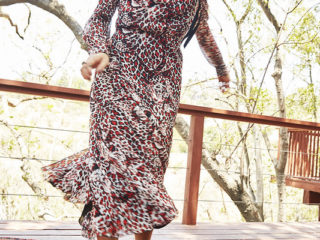Fear is an emotion that tells your body to fight or flee. We’ve all experienced this in some form, whether it’s being on a thrilling roller-coaster ride, getting a call from the doctor with your anticipated results or slamming your brakes at a sudden stop sign.
Many things can make you feel fearful, but right now, you may be experiencing it more than usual. It’s important to not allow yourself to stay in a state of alarm. One of the most important reasons why is the toll that fear can take on your immune system.
According to Cambridge Dictionary fear is defined as, “an unpleasant emotion or thought that you have when you are frightened or worried by something dangerous, painful or bad that is happening or might happen.” This definition includes the potential of what “might happen.” It’s not just addressing tangible threats but also the opportunity for a threat.
Sometimes, I project my fears into the future. I experience fear when my cat bolts out the front door and a truck is driving by. This is a tangible threat. However, I also experience fear when I hear the economy is crashing and wonder what if I can’t pay rent for my business, what if, once things recover, people won’t be able to afford our services, what if I have to pack it up and close for good.
This is when fear moves into anxiety. I’m anticipating what might happen.
According to the World Health Organization (WHO), scientifically, this is what happens when we experience fear: “Our brain (hippocampus and prefrontal cortex) assesses the threat, which prompts the adrenal glands (located above the kidneys) to release hormones including the most popular one, cortisol. Cortisol increases sugar in the bloodstream and suppresses the digestive and reproductive system. It also decreases lymphocytes, a type of white blood cells, which is the immune system’s best friend. The white blood cells and their antibodies communicate with each other to multiple and fight viruses.”
We are all immensely aware of germs and getting sick. To combat this, we are standing six feet away from people, wearing masks or gloves in public, doubling down on hand sanitizer and avoiding social gatherings. With these direct points of contact to germs removed from, we should also be aware of other things that can make us sick indirectly: the worry that comes from checking the news every day, the stress of losing a job, the change of transitioning mid-semester to online schooling and the disappointment of skipping graduations or postponing weddings. When we have increased anxiety and stress, we have less healthy cells to fight bad cells.
We should also be aware of other things that can make us sick indirectly: worry, stress, fear of change and disappointment.
We don’t need to fear fear or cortisol. It can help us act and deal with a situation that needs our immediate attention. Fear helps us to be cautious at the right time. It’s like an innate alarm system.
However, if the alarm stays on and never shuts off, you will trigger that fight or flight response. To decrease the likelihood of this, you must take action. Next time you’re watching/reading the news and you notice your heart race or your hands get clammy, take the following steps:
- Focus on breathing.
Then, ask yourself, “Am I tangibly being threatened or am I anxious?” What this will do is tell your body that you’re safe. - Go for a walk outside.
According to Flo Living, movement is a great way to flush all that cortisol from your body and a good way to soak up Vitamin D if it’s sunny. - Truly rest.
This can mean reading a book or doing yoga—something that doesn’t need too much thought.
Remember: Your body interprets fear as threat. Think about the thing that you fear that is happening and the thing you fear that might happen. Relinquish your sense of control and come back to the present moment. Fear of the unknown will only heighten your chances of getting sick.
Have you ever gotten sick as a result of being stressed or worried? What are some practical ways we can remove the fear of the unknown from being our focus?
Image via Manuela Iodice, Darling Issue No. 19










